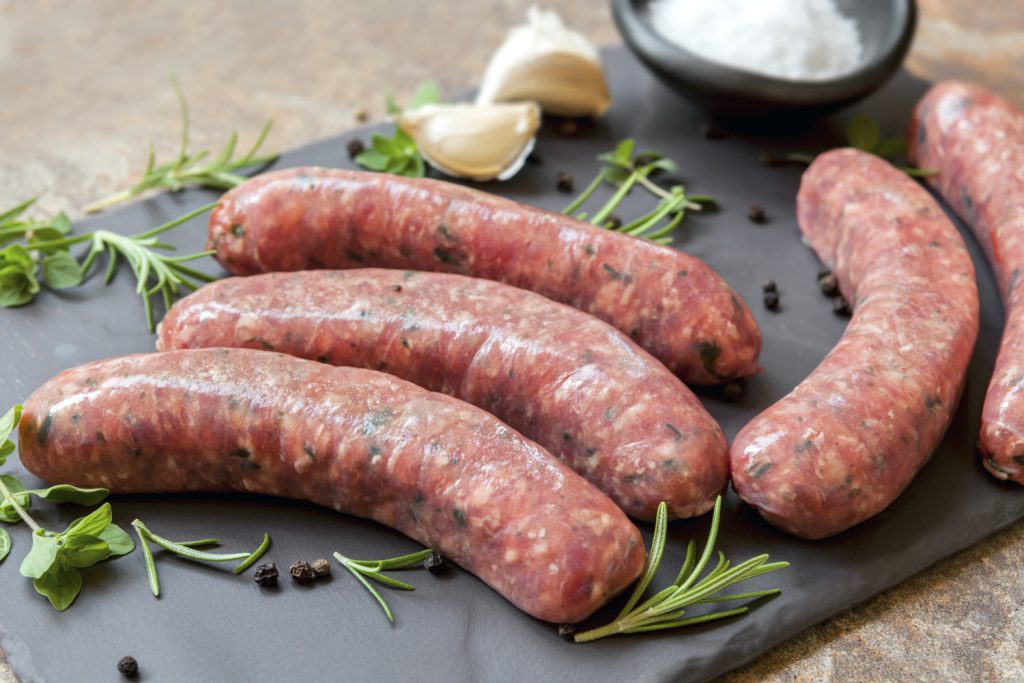
Can dogs eat sausage? Sausages can be very tempting for a dog and a human. Also, these beautiful things look so delightful that we believe it’s okay to feed some of them to our dogs. But can they be given to our dogs? The answer is yes! Dogs can eat sausages, but they shouldn’t be flavored or processed.
Sausages, at least most of them, are not harmful for dog consumption. After all, they are made with meat, which is what most of a dog’s diet is made up of. The other main ingredient used in sausages is breadcrumbs, which are 50 percent carbohydrates. These two ingredients not only make it safe to consume but also very identical to what an expert would tell you the perfect dog’s diet looks like.
Most dog foods are 40-70 percent carbohydrates, which means that they are safe and a very normal component of a dog’s everyday diet.
Please also read best dog food for Australian Shepherd, we discuss foods that are safe and healthy for Australian Shepherd Puppies, Adults, and Seniors.
The Problem with Sausages
The only thing that makes sausages so harmful and dangerous for dogs is that they are often packed with too much salt and seasonings. A homemade sausage can be perfectly healthy for a dog to eat because it will not have any preservatives or commercial additives, mostly of sub-par quality. You want only the best for your dog, and that is why home-cooked sausages are the best option for it.
Why Should Commercial Sausages be Avoided?
The “Processed” Factor
Many studies have found that processed food of ANY type is harmful to dogs. Sausages are mostly made with processed meat with unnatural additives and artificial flavorings that are not healthy for humans or dogs.
Is any amount of processed meat harmful?
You should not feel utterly devoid of any sausage at all only because it’s made with processed meat. A small amount of sausage can still be given if they are fond of eating it.
Pattern and period of consumption also play a role
Other factors also play a role in how dangerous or threatening sausages can be; if you feed “small amounts” of processed sausages daily or even weekly, then it is a cause for alarm. It would help if you were not giving your dog that much sausage. If they are eating it continually every other day or week, your dog WILL develop many health problems such as heart or kidney diseases or even pancreatitis.
Are all Ingredients in Sausages Harmful for a Dog?
No, most contents of sausages are safe for dogs to eat. A dog’s food is often purely meat and vegetables-based, which means that it is healthy and safe for dogs to consume meat.
The Meat
Referring to the main ingredient as “meat” is not enough. Whether the sausage in question is safe or not depends on what type of meat is used in it.
Some of the common kinds of sausage meats and their suitability for dogs have been mentioned below:
Beef Sausage
Lean beef contains high protein levels, making it a very fulfilling source of nutrition for your dog. Lean meat also helps dogs build their immune system because of its high content of iron.
Iron is a great way to protect your dog against many diseases and health problems, such as its help prevent anemia, which is a prevalent disease in dogs and can be challenging to deal with.
Chicken Sausage
Chicken is completely safe for a dog’s consumption and offers various nutritional value and health advantages. It is an excellent source of protein for dogs; it also contains a suitable type of fatty acid, such as omega-6, which boosts skin health.
Chicken is also great for boosting the bone health of your dog.
Turkey Sausage
Plain turkey sausages can also be very healthy and nutritious for your dog as long as they are not processed with artificial flavorings or have spices in them.
Turkey helps dogs get protein and minerals such as phosphorous that their bodies need without a high amount of fat and calorie intake, which can be very threatening for dogs.
Pork Sausage
Pork sausages are among the most harmful types of sausages that you can give to a dog. Unlike other meats on this list, pork is not considered healthy for dogs because of its high fat and salt levels.
Pork sausages are a complete no-no for your dog, especially if they face heart or kidney disease or are overweight. Giving pork sausage can worsen their health conditions.
Salt
Sausages are typically made with a high salt content, which does not compliment your furry friend’s health at all. It is also actively damaging to a dog’s stomach because high salt ranges can cause salt-poisoning.
Salt-poising can happen with only a small amount of salt consumption. It can be very irritating and disorienting for your dog as it causes loss of appetite, weakness, and lethargy.
An excessive level of salt in your dog’s body can also make it always thirsty and dehydrated.
Can Dogs Eat Mcdonald’s? McDonald’s burgers can be ok feed to your dog (without cheese, onion, pickles, and sauces), providing it’s just the meat patty part.
A Complete no-no for Small Puppies and Older Dogs
Small pups need a lesser intake of everything because of their body weight. Many experts say that small dogs can’t survive more than 1.5g of salt per pound of their weight.
Moreover, older dogs often have high blood pressure and already remain at risk of catching heart disease. This means a lot of salt, and hence sausages can be life-threatening for an older dog.
Sausages are best avoided when it comes to small and older dogs.
However, dogs do need at least some amount of salt to get their cells to function correctly. The rule of thumb is to only give around 0.25g-1.5g per 100 grams of the food. The right amount of salt in your sausages can help your dog keep their cellular functions healthy.
Fluid balance and acid-based balance both need at least some amount of salt to function correctly.
So what does this tell us?
This means that the salt in sausages itself is not harmful or even toxic to the dog because their body will happily accept and use up the salt. However, if you give a sausage with a lot of salt to your dog today, avoid giving any other food with salt on the same day.
And this also means that you should prepare a home-cooked sausage which can be easy to make and does not take much time. P
packaged sausages are also targeted to satisfy the taste buds of humans and, as a result, contain more salts and fats than needed for a dog.
Seasoning and Spices
Sausages often contain a lot of spices absorbed in them for extra flavor and texture. While this is great for us humans, it will only bring health troubles for a dog. The seasonings used for a sausage contain ingredients such as onion, onion powder, or even garlic.
These seasonings can cause gastrointestinal dysfunction in your dog, causing severe diarrhea, vomiting, and low energy levels.
Garlic and onion are two ingredients that are infamous for causing all types of health problems and diseases in dogs, and therefore, a sausage with seasonings and spices is something to be kept away from your dog.
The Amount of Fat
Sausages can be more than 50% fat. They typically include around 27-30 grams of fat per 100 grams of serving. And healthy dog foods usually have only 14-20 grams of fat per 100 grams. You should make sure that the combined amount of fat present in the sausage remains close to that range.
You can calculate how much fat there is by combining the amount of fat in the meat, breadcrumbs, and other vegetables.
Consumption of high-fat levels for extended periods will give rise to many health disadvantages, including heart diseases, obesity, and even pancreatitis.
Cooked Vs. Raw Sausages
If you must give a sausage to your dog, and you have been able to make or purchase a dog-friendly one. Make sure that you give it a cooked one and not the raw sausage.
Cooking the sausage can have many benefits
Raw sausages often have many bacteria that can damage a dog and make your dog very sick, as it can cause Salmonella or E Coli.
Conclusion
The only thing you need to worry about when giving sausage to your dog is the preservatives, seasonings, and salt in it. There are many dog-friendly sausages as well that eliminate any preservatives and artificial flavorings from them.
However, because they can be costly, you can also blend up your sausage mix in only 5-10 minutes.
The final lesson here is not to give commercial and processed sausages to your dog, especially those targeted for human consumption and not dogs.
While they are not life-threatening or toxic for dogs, they are best avoided because they can still cause an upset stomach and disorientation to the dog.
